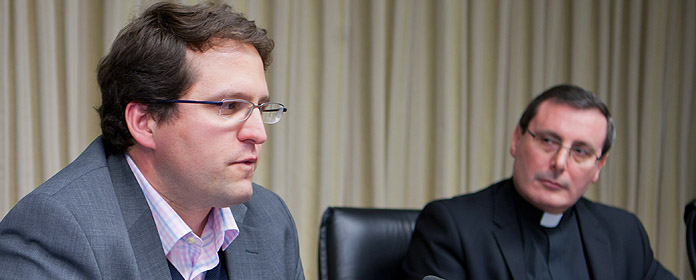Education liberalism and Christianity at university
seminar from teachers to position by José María Torralba

The director of the Institute of Anthropology and Ethics and professor of Philosophy of the University of Navarra, José María Torralba, directed last Thursday, May 15, a seminar to the professors of the School of Theology.
The speaker defended the thesis that what "began in Bologna, Paris, Oxford and Salamanca, and then developed in Berlin, continues to live on in some campus of the United States, such as Columbia or Chicago. What continues to live? The university as the temple of the liberal Education , that is, as an institution that, as Newman says, is not dedicated "to the moral reformation of students, nor to mechanical production; but its function is intellectual culture. It educates the intellect to reason rightly in all matters, to go in search of truth and to attain it.""
Of particular interest to Torralba are the subjects that make up core curriculum , which consist mainly of reading and discussion in small groups (15 students) of the great works of literature, history and thought, as well as covering the fundamentals of natural sciences.
A liberal Education is characterized by transmitting and update the cultural tradition and places the student before the great questions of existence and makes him see that, for example, questions such as "what is the human being?" or "in what does happiness or justice consist?" cannot be avoided. And that, even if they are not easy to answer, there is an answer. This would be the sapiential perspective. It is also necessary to teach student the ability to judge, to "become position", to "grasp" the universal in the particular or, in other words, to clothe a particular datum with the idea that corresponds to it and gives meaning to the whole.
And finally, the liberal Education cultivates interest in truth and makes it "the only valid currency of intellectual, moral and social life. This can be one of the best contributions of the university and can have a notable influence on society". The vindication of truth has been one of the central themes in the magisterium of Pope Emeritus Benedict XVI.
José María Torralba appealed to the need to overcome the fallacy of neutrality, so that the tradition (the presuppositions) of each doctrine or affirmation is made clear. To this end, he made use of the concept of"forced disagreement" of Alasdair MacIntyre, Scottish philosopher, who also maintains that in an authentic university, the question of God cannot be left out and that, in this sense, theology and Philosophy have a mediating role to play between the various forms of knowledge. "In such a university, theology would be taught as an end in itself and as a core topic for general understanding. And it would be a central task of the Philosophy to inquire into the nature of the relationship between theology and secular subjects," MacIntryre wrote.
